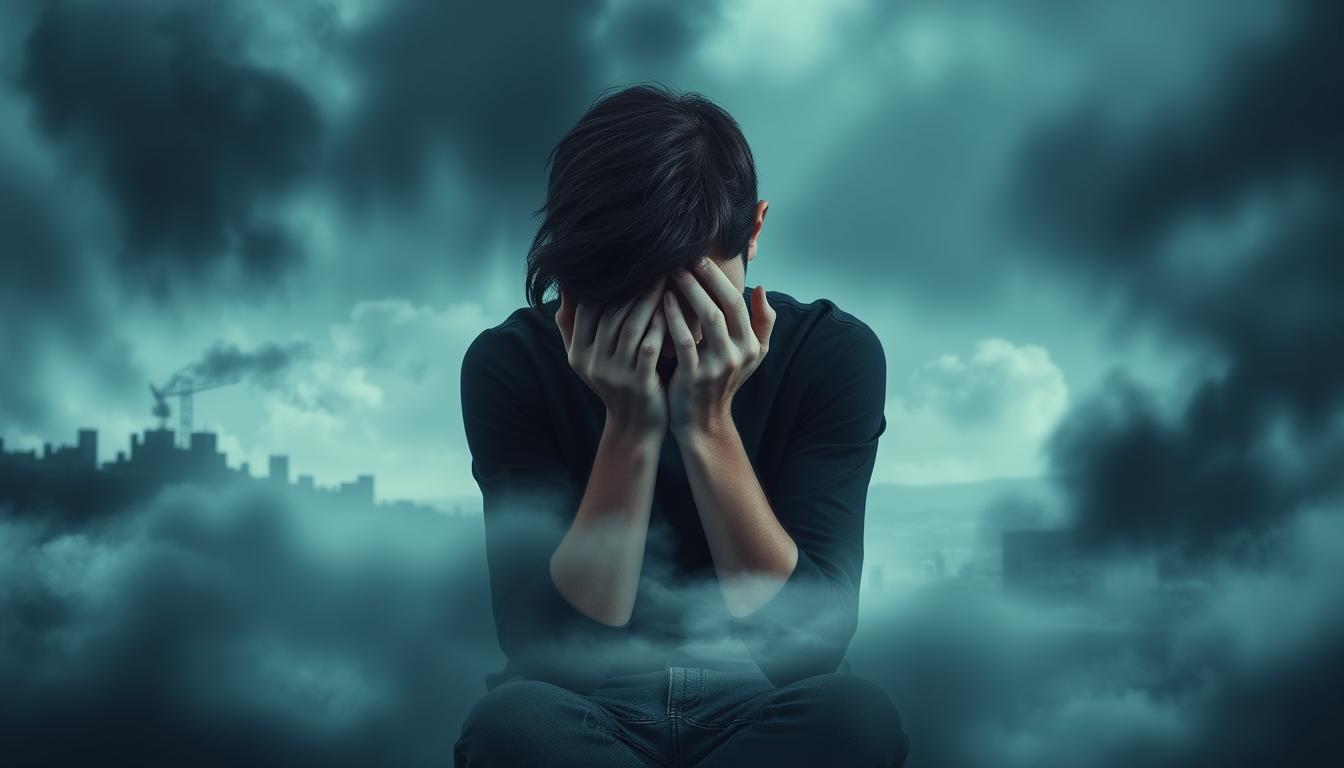I am a participant in the Amazon Services LLC Associates Program, an affiliate advertising program designed to provide a means for sites to earn advertising fees by advertising and linking to Amazon.com and affiliated sites. This post contains affiliate links. Privacy Policy
Have you ever felt overwhelmed by worry or fear that controls your day? You’re not alone. Anxiety disorders affect millions, making it hard to live and enjoy life.

It’s important to know if anxiety is a mental illness. This article will help you understand anxiety disorders. We’ll explore its different sides and its link to mental health.
Best brain supplement!
Key Takeaways
- Understanding anxiety as a potential mental health issue.
- Recognizing the symptoms of anxiety disorders.
- The importance of seeking professional help for anxiety.
- Exploring treatment options for managing anxiety.
- The impact of anxiety on overall mental health.
What Is Anxiety and Is Anxiety a Mental Illness?
Feeling anxious is common and can be mild or severe. It affects millions worldwide. Knowing about anxiety’s types and how it fits into mental health is key.
Defining Anxiety in Clinical Terms
Anxiety is feeling worried, nervous, or scared that lasts too long. It’s normal when it helps us prepare for tough times. But, if it gets too much and stops us from living our lives, it’s an anxiety disorder.
Key characteristics of clinical anxiety include:
- Persistent fear or worry
- Interference with daily activities
- Physical symptoms such as rapid heartbeat or trembling
The Difference Between Normal Anxiety and Anxiety Disorders
Normal anxiety is manageable and tied to a specific situation. Anxiety disorders are more severe and affect daily life a lot.
Consider the following differences:
- Normal anxiety is usually triggered by a specific stressor and resolves once the stressor is removed.
- Anxiety disorders are characterized by anxiety that is not proportional to the situation or persists in the absence of a clear stressor.
How Anxiety Disorders Are Classified in Mental Health
Anxiety disorders are grouped based on symptoms, severity, and how they affect daily life. The DSM-5 helps diagnose and treat them. Knowing how they’re classified helps find the right anxiety treatment and anxiety management.
Common classifications include:
| Disorder | Description |
|---|---|
| Generalized Anxiety Disorder | Excessive worry about multiple aspects of life |
| Panic Disorder | Recurring panic attacks |
| Social Anxiety Disorder | Fear of social or performance situations |
Knowing the causes and symptoms of anxiety is key for managing it. It helps promote mental health awareness. Understanding anxiety and its disorders helps find the right help and support.
Types of Anxiety Disorders You Should Know
Anxiety disorders come in many forms, each with its own challenges. Knowing these differences helps find the right treatment for you or your loved ones.
Generalized Anxiety Disorder (GAD)
Generalized Anxiety Disorder makes you worry too much about everyday things. Even when there’s no reason to worry. People with GAD find it hard to focus and make decisions because of persistent anxiety.
If you worry a lot about health, money, or relationships, and it stops you from living normally, you might have GAD.
Social Anxiety Disorder
Social Anxiety Disorder makes you fear being judged or embarrassed in social situations. This fear can make you avoid social interactions. If you feel overwhelming self-consciousness in social settings, fearing judgment, you might have social anxiety.
Panic Disorder
Panic Disorder causes recurring panic attacks. These are intense episodes of fear or discomfort that peak in minutes. Symptoms include rapid heartbeat, sweating, and trembling. Knowing your triggers and learning to cope is key to managing panic disorder.
Phobias and Specific Anxiety Disorders
Phobias are intense, irrational fears of specific objects or situations. For example, someone with arachnophobia might feel a lot of distress around spiders. Specific anxiety disorders can also include fears of certain situations, like flying or being in enclosed spaces.
Knowing what triggers your phobia is the first step to finding the right therapy. Exposure therapy, for instance, can be very effective.
Obsessive-Compulsive Disorder and PTSD
Obsessive-Compulsive Disorder (OCD) involves unwanted thoughts (obsessions) that lead to repetitive behaviors (compulsions). For example, someone with OCD might compulsively wash their hands due to an obsession with cleanliness.
Post-Traumatic Stress Disorder (PTSD) can develop after a traumatic event. Symptoms include flashbacks, severe anxiety, and uncontrollable thoughts about the trauma. Treatment for PTSD often involves therapy and, in some cases, medication.
Understanding the different types of anxiety disorders is the first step towards finding the right treatment. Whether it’s therapy, medication, or a combination of both, there are many effective treatments for managing anxiety.
Recognizing the Symptoms and Causes of Anxiety
Anxiety affects millions, and knowing its symptoms and causes is key. If you or someone you know is dealing with anxiety, spotting the signs is the first step. This is crucial for finding the right help.
Physical Symptoms of Anxiety
You might feel a fast heartbeat, sweat, or shake. These signs can be scary and often show up first.
Psychological and Emotional Symptoms
Anxiety can also show up in your mind and feelings. You might feel scared, worried, or restless. It can make you feel overwhelmed or unable to focus on everyday tasks.
As Dr. Smith says, “Anxiety can be really tough, affecting not just the person but their family too.” It’s important to understand these emotional parts.
Common Causes and Risk Factors
Many things can lead to anxiety, like genes, environment, and life events. Knowing these can help in finding the right anxiety management strategies.
The Diagnosis Process
Getting a diagnosis for anxiety means a detailed check-up by a doctor. They’ll look at your symptoms, health history, and other details. This helps figure out if you have an anxiety disorder and what kind.
Treatment and Management Strategies for Anxiety
Anxiety management includes many strategies, like therapy, medication, and lifestyle changes. It’s important to understand these options to find what works for you.
Evidence-Based Therapy Approaches
Several therapy methods are proven to help manage anxiety. Cognitive Behavioral Therapy (CBT) helps people change negative thoughts. Acceptance and Commitment Therapy (ACT) teaches accepting emotions while moving towards life goals.
Medication Options and Considerations
For some, medication is key in managing anxiety. Selective Serotonin Reuptake Inhibitors (SSRIs) are often used because they work well and have fewer side effects. Always talk to a healthcare provider about the benefits and risks.
Lifestyle Changes That Help Manage Anxiety
Changing your lifestyle can greatly reduce anxiety. Exercise helps by releasing endorphins, which boost mood. Also, mindfulness and relaxation techniques, like deep breathing or meditation, can calm the mind.
Complementary and Alternative Approaches
Some people find alternative methods helpful for anxiety. Herbal supplements like passionflower or kava might help, but always check with a healthcare provider first. Yoga and tai chi combine physical movement with deep breathing, promoting relaxation.
Conclusion: Living Well with Anxiety
Understanding anxiety is key to managing it. Recognizing symptoms and causes helps you find the right help. Mental health resources offer guidance on diagnosis, therapy, and coping.
You’re not alone in facing anxiety. Many resources, like support groups and therapy, are available. Online forums and hotlines also offer valuable information and connections.
Managing anxiety requires a mix of treatments, lifestyle changes, and self-care. Medications and therapy are important parts of a plan. Taking action can greatly improve your mental health.
With the right knowledge and support, you can manage anxiety well. Look for mental health resources and help to create a plan. This will help you improve your mental health.
FAQ
Is anxiety considered a mental illness?
Yes, anxiety is seen as a mental health issue. It’s classified as a mental illness. It can really affect your daily life and how you feel overall.
What are the common symptoms of anxiety?
Symptoms of anxiety include physical signs like a fast heartbeat and shaking. You might also feel worried or scared all the time. Feeling overwhelmed and restless are emotional signs too.
What are the different types of anxiety disorders?
There are many types of anxiety disorders. These include Generalized Anxiety Disorder (GAD) and Social Anxiety Disorder. Panic Disorder, Phobias, and Specific Anxiety Disorders are others. Obsessive-Compulsive Disorder (OCD) and Post-Traumatic Stress Disorder (PTSD) are also part of this group.
How is anxiety diagnosed?
A mental health expert will diagnose anxiety. They’ll do a physical check, ask you questions, and look at your medical and mental health history.
What are the treatment options for anxiety?
To treat anxiety, you can try therapy like Cognitive-Behavioral Therapy (CBT). Medications like antidepressants and benzodiazepines are also options. Changing your lifestyle, like exercising and managing stress, can help too. Mindfulness and relaxation techniques are other ways to cope.
Can anxiety be managed without medication?
Yes, you can manage anxiety without meds. Making lifestyle changes, trying therapy, and using complementary methods can work. But, some people might need medication to control their symptoms.
How can I cope with anxiety?
To deal with anxiety, try deep breathing, exercise, and managing stress. Getting help from mental health experts, support groups, and loved ones is also key.
What are some common causes and risk factors for anxiety?
Anxiety can be caused by genetics, brain chemistry, and life experiences. Trauma and stress are also factors. Certain medical conditions and substance abuse can increase your risk too.
How can I find resources for anxiety support?
For anxiety support, reach out to mental health organizations. Look for online resources and support groups. Also, talk to mental health professionals in your area.
Is anxiety a sign of weakness?
No, anxiety is not a sign of weakness. It’s a real mental health condition. It can affect anyone, no matter how strong or resilient they are.
I am a participant in the Amazon Services LLC Associates Program, an affiliate advertising program designed to provide a means for sites to earn advertising fees by advertising and linking to Amazon.com and affiliated sites. This post contains affiliate links. Privacy Policy


